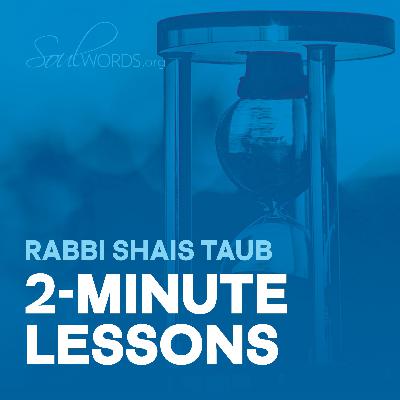Discover 2-Minute Lessons with Rabbi Shais Taub
2-Minute Lessons with Rabbi Shais Taub

2-Minute Lessons with Rabbi Shais Taub
Author: rabbi.taub@gmail.com (Rabbi Shais Taub)
Subscribed: 12Played: 57Subscribe
Share
© 2020 SoulWords.org
Description
Always have something ready to say at the Shabbos table or anywhere! Rabbi Shais Taub presents a hyper-condensed 2-minute dvar Torah for you to share with your family and friends.
25 Episodes
Reverse
What should our attitude toward mundane activities be? How do we prioritize between spiritual affairs and practical concerns?
We must express all of our potentials and use them to serve Hashem.
The paradox of this week’s double Torah portion teaches us how to make great groups and great individuals.
How is it possible that so many people were enticed to worship the Golden Calf? And more importantly, how did all of the women successfully resist?
The Choshen (breastplate) of the High Priest did not function properly in the 2nd Temple. How is this a metaphor for Exile? (Based on Likkutei Sichos vol. 11, pp. 137-138.)
Hashem wants there to be chesed in the world. In order for that to happen, someone’s gotta give and someone’s gotta receive. Here’s what to think about when you’re the one receiving.
The 620 letters of the Ten Commandments contain the secret to being G-d’s friend.
Spreading the inner secrets of the Torah will bring Moshiach. But you need to "translate" these ideas into relevant language.
We know the precise times of two events in this week's parsha. The slaying of the firstborn took place at midnight and the actual exodus from Egypt took place at noon the next day. Based on a Michtav Klali of the Rebbe from 5744, we learn the significance of midnight and noon in our personal […]
Was Moshe starting up with Hashem or was he expressing fascination with Hashem’s ways? And what does this mean for me?
What is the symbolism of the burning bush? Here is one explanation from a maamar of the Frierdiker Rebbe. It's talking about two opposite fires: the passion of the righteous for G-d and the passion of the wicked for earthly pleasures. The Torah is the solution for how to survive both of these.
Yaakov blessed the sons of Yosef to "prosper like fish" which is explained to mean that they should be protected from the evil eye. What about being "fish-like" protects us from being damaged by the jealousy of others? (Based on Likkutei Sichos vol. 25, pp. 11-12.)
Okay, this week's 2-minute Torah thought is a little bit on the cute side. Please forgive me.
The dreams of Pharaoh and of Yosef teach us about why the Maccabees fought the Greeks.
What is the most appropriate reward for a good deed? The opportunity to more good deeds! (Based on Sichos Kodesh 5734, vol. 1, p. 212.)
Why did Yaakov behave so obsequiously toward Eisav at their reunion when he was supposed to have been guaranteed to be a master over his brother? We learn from the Alter Rebbe in prison that our objective is not destruction of the opposition but to refine it and win it over to our side. (Based […]
When Yakov received the blessings from his father Yitzchak he was dressed like his wicked brother Eisav. Why was it important to be blessed while wearing such a costume?
Part of the impact that a mitzvah has on the world is related to the physical effort that it requires us to expend. Avraham's healing process after his circumcision was thus essential to his bris milah having the fullest possible effect. (Based on Likkutei Sichos Vol. 5, p. 82.)
There is no real contradiction between personal growth and being an activist who helps others. The way that we discover our inner talents is by going out into the world and dealing with other people. (Based on Sefer HaSichos 5749 p. 47.)
From the fact that Noah looked for signs that the flood was over we learn the importance of looking for signs of Moshiach's arrival. (Based on a sicha from 10 Tammuz 5745.)





